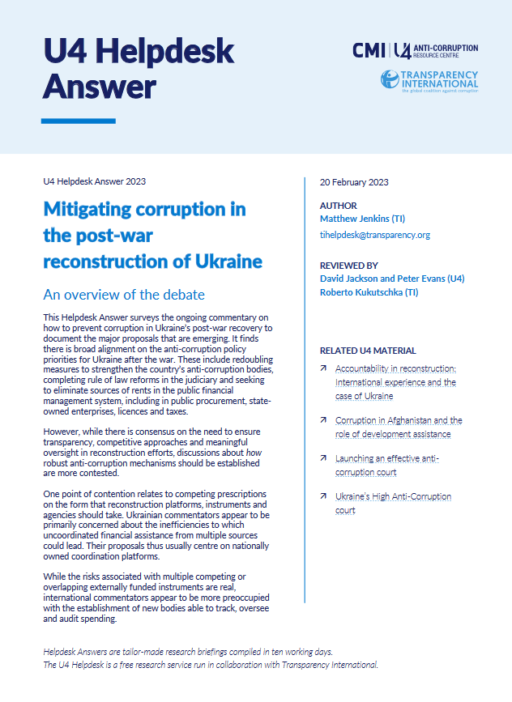- Home
- Anti-Corruption Helpdesk
- Mitigating corruption in the post-war reconstruction of Ukraine: An overview of the debate
Mitigating corruption in the post-war reconstruction of Ukraine: An overview of the debate

This Anti-Corruption Helpdesk brief was produced in response to a query from a U4 Partner Agency. The U4 Helpdesk is operated by Transparency International in collaboration with the U4 Anti-Corruption Resource Centre based at the Chr. Michelsen Institute.
Query
Please provide an overview of corruption risk factors for the future reconstruction of Ukraine, as well as a summary of the debate on the most suitable measures to minimise corruption.
Summary
This Helpdesk Answer surveys the ongoing commentary on how to prevent corruption in Ukraine’s post-war recovery to document the major proposals that are emerging. It finds there is broad alignment on the anti-corruption policy priorities for Ukraine after the war. These include redoubling measures to strengthen the country’s anti-corruption bodies, completing rule of law reforms in the judiciary and seeking to eliminate sources of rents in the public financial management system, including in public procurement, state-owned enterprises, licences and taxes.
However, while there is consensus on the need to ensure transparency, competitive approaches and meaningful oversight in reconstruction efforts, discussions about how robust anti-corruption mechanisms should be established are more contested.
One point of contention relates to competing prescriptions on the form that reconstruction platforms, instruments and agencies should take. Ukrainian commentators appear to be primarily concerned about the inefficiencies to which uncoordinated financial assistance from multiple sources could lead. Their proposals thus usually centre on nationally owned coordination platforms.
While the risks associated with multiple competing or overlapping externally funded instruments are real, international commentators appear to be more preoccupied with the establishment of new bodies able to track, oversee and audit spending.
Main points
- Both in Ukraine and abroad, there is a keen sense that military success on the battlefield may only represent a partial victory if Ukraine is unable to emerge from the war on a trajectory towards the rule of law, control of corruption and democratic accountability.
- There is a widespread view that the savvy and strategic use of reconstruction funds can set Ukraine on this path, but that without strong oversight in the use of these funds, international financial support risks “reversing the country’s progress in fighting corruption” (Murtazashvili and Shapoval 2022).
- There is broad consensus on the need for continued judicial reform, the engagement of non-state actors and local government, as well as the importance of open data initiatives and procurement safeguards.
- In contrast, there are rival proposals for the appropriate institutional architecture to deliver and monitor reconstruction funds.
Contents
- Introduction
- Main emerging challenges and risk factors
- Anti-corruption capacity and readiness
Policy options for Ukraine’s reconstruction
- Approaches that enjoy general consensus
- Differences in emphasis or technical detail
- Areas of disagreement
- Approaches that enjoy general consensus
References
Caveat
The words ‘reconstruction’ and ‘recovery’ are often used in conjunction and even interchangeably in the discussion on post-war Ukraine (see European Commission 2022a). While reconstruction implies the rebuilding of physical infrastructure damaged or destroyed in the ongoing war, recovery encompasses a broader array of social sectors and services, including healthcare, education and social protection.
Most of the proposed anti-corruption actions discussed in this Helpdesk Answer (such as judicial reform, public procurement safeguards or robust audit processes) are at a level of abstraction high enough to be relevant to both reconstruction initiatives and recovery efforts. Indeed, as yet, the majority of commentators make little distinction between reconstruction and recovery when discussing the post-war anti-corruption priorities for Ukraine.
Nonetheless, reconstruction of damaged road networks entails very different risks to delivering public services. Therefore, Jackson and Lough (2022: 13) caution that once specific reconstruction and recovery projects begin, “each major investment or sector [will require] its own corruption risk analysis and sector-specific policies.”
Authors
Matthew Jenkins (TI) [email protected]
Reviewers
David Jackson and Peter Evans (U4)
Roberto Kukutschka (TI)
Date
21/02/2023

